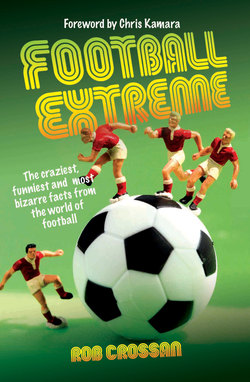Читать книгу Football Extreme - Rob Crossan - Страница 12
На сайте Литреса книга снята с продажи.
ОглавлениеEXTREME CUP REPLAY
How Oxford City and Alvechurch took over ten hours to resolve a cup tie
The concept of the endless cup replay is an entirely alien first-hand experience to anybody under the age of 30 nowadays. Before the early 1990s, when this eccentricity was abolished by the FA, it was one of the great oddities of the FA Cup. Penalty shoot-outs, golden goals; these were all considered to be dangerous modern trends. If two teams playing each other in a cup tie should happen to draw after extra time then there would be a replay. And if that game also ended in stalemate, then there would be another replay. And another, and another…
The last of these endless cup replays occurred back in 1991 when it took Arsenal and Leeds four games to settle a tie. But for the all-time record, we have to head back to 1971 and a first round tie between Oxford City of the Isthmian League and Alvechurch of the Midland Combination League.
Nobody in the crowd that rolled up on Saturday 6 November to Lye Meadow, the home of Alvechurch (complete with that staple FA Cup eccentricity of a sloping pitch that invariably gets referred to as ‘notorious’), could have known that it would be another 588 minutes before they’d see the winning goal.
Two down at half time, Oxford City revived in the second half with two goals of their own to set up the first replay at the White House ground in Oxford the following Tuesday. Two goals in the first half, one apiece, and a goalless second half meant that a second replay was required, this time at the neutral venue of St. Andrews, home of Birmingham City. 3,600 by now no doubt bemused supporters turned up to see two first-half goals, followed by none in the second half, once again result in a one-all draw.
Four days later on a Wednesday night they tried again, this time at Oxford United’s home, the Manor Ground. By this time the strain was starting to show for the part-time players. Car plant worker Eric Davis could no longer turn out for Alvechurch thanks to his night shift commitments and Oxford City’s Eric Metcalfe was forced to take time off from his day job as a schoolteacher after damaging his fibula.
The fourth tie ended goalless. The fifth, once again played at the Manor Ground, was to prove equally frustrating. Incredibly, the full 90 minutes plus extra time ticked by and the score still remained goalless. The teams were required to meet for an unprecedented sixth time, though by this stage the fixture backlog was becoming a major concern. The two teams knew that an away tie with Aldershot awaited the winners. They’d known this since the time of the first replay. So, barely 48 hours after their latest stalemate, the two sides met again on a Monday night.
City’s boss, John Fisher, was forced to make changes when the army, who seemed to have grown tired of having to sign endless release forms, refused to let two of their soldiers – who had been turning out for Oxford – play. They were the lucky ones. One elderly Alvechurch supporter collapsed and died during the last game at the Manor Ground. He was never to know that he was only one game away from finally seeing a conclusion to the most extreme series of cup replays Britain has ever seen.
DID YOU KNOW?
Cardiff City are the only non-English team to have won the FA Cup, lifting the trophy in 1927.
Bobby Hope was the man who finally ended it all, netting in the 16th minute of the fifth replay for Alvechurch. It would turn out to be the only goal of the game. It had taken six attempts, but finally there was a winner. For some Alvechurch players, the marathon, coupled with their league games, meant they had played 12 games in three weeks.
Sadly, though, Alvechurch failed to capitalise, losing 4-2 in the next round to Aldershot. There were suggestions afterwards that T-shirts should be printed for the supporters who had attended all six games – the original tie plus all five replays. Though as Graham Almer, who appeared in an Alvechurch shirt in all six of the matches, explained, the bond between the two clubs went way beyond a novelty slogan printed on cotton.
‘We didn’t know the Oxford players at the start, but we were on first-name terms at the end,’ he recalled. ‘We were turning up as if long-lost mates – the same teams, the same players, the same result. It was character-hardening. Tactics went out of the window. We just carried on playing the same way.’
